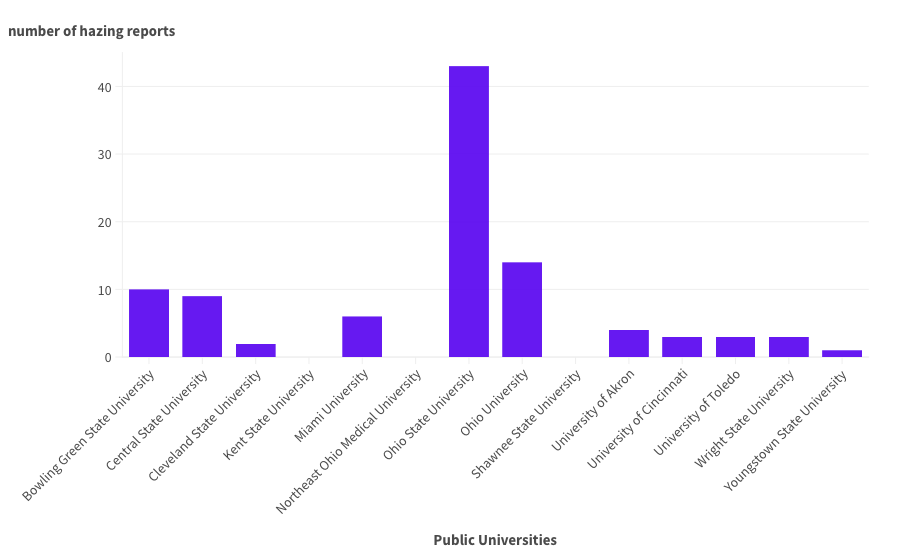BY MEGAN HENRY
Ohio State University resolved eight hazing incidents so far this year, according to the university’s latest Collin’s Law report.
Hazing became a felony in Ohio in 2021 when Gov. Mike DeWine signed Collin’s Law: Ohio’s Anti-Hazing Act into law. Previously, hazing was a fourth-degree misdemeanor.
The law is named after Collin Wiant, an 18-year-old Ohio University freshman who died from hazing in November 2018.
Collin’s Law requires Ohio universities to report hazing violations and update their reports on Aug. 1 and Jan. 1. It also mandates a statewide curriculum for college students about hazing and expanded the definition of hazing to include “coercing another to consume alcohol or a drug of abuse.”
State Sens. Stephanie Kunze, R-Hilliard, and Theresa Gavarone, R-Bowling Green, sponsored the bill during the last General Assembly.
“At the most extreme, we’ve had students killed by hazing,” said Elizabeth Allan, a professor at the University of Maine who leads StopHazing, a research entity focused on hazing and hazing prevention.
Hazing is a felony in 15 states and 44 states have some kind of anti-hazing laws on the books.
It’s too early to tell though if states that have hazing as a felony see a decrease in the number of reported hazing incidents, Allan said.
“There hasn’t been enough time to collect the data to see the comparison,” she said.
At least one U.S. school, club or organization hazing death was recorded every year from 1959 to 2021, according to Hank Nuwer’s research. He is a professor emeritus at Franklin College in Indiana, who tracks hazing deaths and is the author of “Hazing: Destroying Young Lives.”
Ohio State University
Ohio State’s Delta Kappa Epsilon and Phi Sigma Kappa both had two hazing incidents and Delta Omega Kappa had one hazing incident, according to the August report.
Phi Sigma Kappa had an event in March called “fruit salad” where the new members were expected to finish all the food that was placed in front of them.
“The food provided included steak put in front of a vegetarian, mustard on a tomato, mildly hot peppers and ranch on a banana,” according to Ohio State’s report.
Providing alcohol to those who are underage and yelling at new members came up often in the report.
Delta Omega Kappa reportedly “threatened new members with bodily harm” and “required one new member to stay in a house despite having severe cat allergies while a cat was in the house.” These incidents were reported in November, but charges and a resolution both happened in January.
Another reported incident only involved one person because that student failed to report hazing.
“While hazing can and does occur in fraternities and sororities, it is an issue for all of society including the entire university community, and we are taking a campus-wide approach in efforts to stop hazing,” Ryan Lovell, Ohio State’s associate vice president for health and well-being in the office of Student Life said in an email.
Ohio State started an annual education module for students, faculty and staff last fall to help recognize and report hazing, and outlines the criminal penalties for hazing.
“The ultimate goal is to create social norming around hazing prevention on campus,” Lovell said in an email. We want to normalize behavior that encourages people to report if they have seen, experienced or even heard about possible hazing. … As this socializing has and is occurring, we expected and are pleased to be receiving more reports of hazing, especially as students, faculty and staff become more knowledgeable about the signs of hazing as well as a better understanding of when and how to report suspected cases.”
Other universities
Bowling Green State University had one report of hazing during the Spring Semester. Zeta Phi Beta Sorority was suspended for three years after requiring “acts which may adversely affect their mental health or dignity and were required to participate in rigorous physical exercises,” according to Bowling Green’s website.
Central State University had one hazing report in January and actions are still pending, according to Central State’s website.
Miami University had two reports of hazing during the spring semester — Delta Sigma Phi and the Miami University Dance Team.
Cleveland State University, Kent State University, Northeast Ohio Medical Center, Ohio University, Shawnee State University, Wright State University, Youngstown State University, University of Akron and University of Cincinnati all reported zero no incidents of hazing during the Spring Semester.
However, lots of hazing reports go unreported, Nuwer and Allan said.
“When students realize or recognize that they have been hazed, there’s a lot of fear about reporting,” Allan said. “Sometimes students might not recognize what’s happened as hazing until later, when they gain a better understanding about hazing.”
College students can especially be hesitant to come forward about Greek life hazing because they don’t want to get the fraternity or sorority in trouble, Allan said.
January report
Universities were required to publish their first Collin’s Law report in January, which included hazing reports from previous years.
- Ohio State — 43 reports of hazing between Aug. 1, 2023 and Oct. 7, 2016.
- Ohio University — 14 violations reported from January 2018 to August 2023.
- Bowling Green — 10 reported incidents between 2019-2023.
- Central State University — nine hazing reports from 2019 to Aug. 1, 2023.
- Miami University — six incidents between 2023 and 2019.
- The University of Akron — four hazing incidents in 2020 and 2021.
- Wright State — three hazing incidents on their website from 2019 and 2021.
- The University of Toledo — three hazing reports on its website, one in 2018 and two in 2017.
- University of Cincinnati — three hazing reports from 2017, 2021 and 2023.
- Cleveland State University — two hazing violations in 2018 and 2019.
- Youngstown State — one hazing violation in 2012.
Nuwer said students who endure these hazing rituals aren’t thinking about the consequences.
“The need to belong is so strong,” he said.
Allan said she has heard similar things in her research.
“You hear things like, ‘Well, I wanted to prove myself’,” she said. “It still relates back to being seen as a legitimate member or as earning one’s place.”

Hazing deaths
Two male students at Ohio universities died in the past five years because of hazing rituals.
Wiant, the Ohio University freshman, died of asphyxiation after inhaling a canister of nitrous oxide at a Sigma Pi’s off-campus house in Athens.
Sigma Pi members who were with Wiant waited several minutes after he started gasping for air to call 911. He died hours later in a hospital. Ohio University expelled Sigma Pi in April 2019.
Nine people were charged in connection to Wiant’s death. The Columbus Dispatch published an in-depth audio series called “Broken Pledge” that tells the story of Wiant.
Stone Foltz, a 20-year-old sophomore at Bowling Green, died of fatal alcohol poisoning during hazing in March 2021. He was forced to drink a handle of hard liquor as part of his initiation to Pi Kappa Alpha fraternity.
Foltz’s roommates found him unconscious after he was dropped off at his apartment and he died in the hospital two days later. Pi Kappa Alpha was permanently banned from BGSU a month later.
Eight men were charged in connection to Foltz’s death.





